Probiotics are well known for protecting against harmful bacteria in the gut and supporting immune function. Beyond this, they have shown promise in mitigating cardiovascular risk factors, improving constipation, and reducing symptoms of depression. (1, 2, 3)
We’ve reviewed dozens of probiotic supplements and rounded up the top nine for women. Whether you want to support your gut and immune health or alleviate common symptoms associated with irritable bowel syndrome (IBS), we’ve got the best women’s probiotic for you.
Editor’s choice
Ritual Synbiotic+ is our top choice for women because it’s a 3-in-1 supplement that combines prebiotics, probiotics, and postbiotics. This synergistic formula addresses key areas for women, including digestive and vaginal health. Discover why this probiotic received our top nomination by reading the testing notes in the review below.
Medical disclaimer: This article is intended for educational and informational purposes only. It is not intended as a substitute for medical advice. For health advice, contact a licensed healthcare provider.
Our picks for the best probiotic for women
- Best pre and probiotic: Ritual Synbiotic+
- Best for IBS: VSL #3 Capsules
- Best for women over 50: Nutricost Probiotic Complex
- Best for weight loss: Pendulum Metabolic Daily
- Best for pregnancy: Perelel Third Trimester Prenatal Pack
- Best for gut health: Onnit Total Gut Health
- Best vegan: Ora Organic Trust Your Gut
- Best for vaginal health: O Positiv URO Vaginal Probiotic
- Best daily: Sports Research Daily Probiotics
How to choose the best probiotic for women
If you’re on the hunt for a good women’s probiotic, there are several factors you’ll want to consider.
Strain
The best probiotic for you is the one that contains the strain(s) that address your health concerns. For example, if you have IBS, a multi-strain combination of Bifidobacteria and Lactobacilli could be the most beneficial.
Dosage
Although there is no standardized dose for probiotics, a clinically effective dose seems to be between 1 million and 1 billion CFUs—quite a wide range. Since everyone responds differently to probiotics, the exact strain and dosage can be hard to pinpoint. Still, we recommend probiotic supplements that contain at least 1 million CFU per strain.
Price
Probiotic supplements can cost anywhere from a few cents to over $2 per serving. A higher price tag doesn’t always mean a more effective supplement. Once you’ve considered the strain and dosage, you’ll want to consider the cost and how long you’ll be supplementing.
Third-party testing
It’s always a good idea to choose third-party tested supplements to ensure their safety, potency, and efficacy. However, it may not be as critical in a probiotic supplement as it is for sports supplements for athletes, such as pre-workouts. The risks associated with contamination are typically lower in probiotic products.
Form
All of the probiotics we featured above come in capsule form, but probiotics also come in powders, tablets, drops, and liquid form. A capsule provides the probiotics with protection against stomach acid so they are more likely to make it to your colon. However, some strains of probiotics are resistant to stomach acid.
If you struggle to take pills, capsules, or tablets, a powder or liquid probiotic might be a better solution for you. A powdered probiotic is also more versatile since you can mix it with your favorite protein powder or other foods and beverages.
There’s no clear-cut answer on which form is best. Ultimately, whichever form will help you take the probiotic consistently will be your best option.
Storage requirements
It was previously believed that probiotics had to be refrigerated in order to remain potent. That’s no longer true. That being said, you should always follow the manufacturer’s instructions. If you buy the probiotics from the refrigerated section, they need to remain refrigerated.
Whether a probiotic needs to be refrigerated or not doesn’t imply one is better quality than the other. It’s up to you to decide what makes it easier for you to take your probiotics regularly. If putting them in the fridge out of sight makes you forget about them, it’s probably best to choose a probiotic that doesn’t require refrigeration.
Instructions
When taking a probiotic, it’s always important to follow the instructions from the manufacturer. Some probiotics are fine to take alongside a meal, while others might recommend taking on an empty stomach or away from other supplements. These instructions aren’t likely to make or break your decision-making process, but they’re still something to consider.
Compare probiotics for women
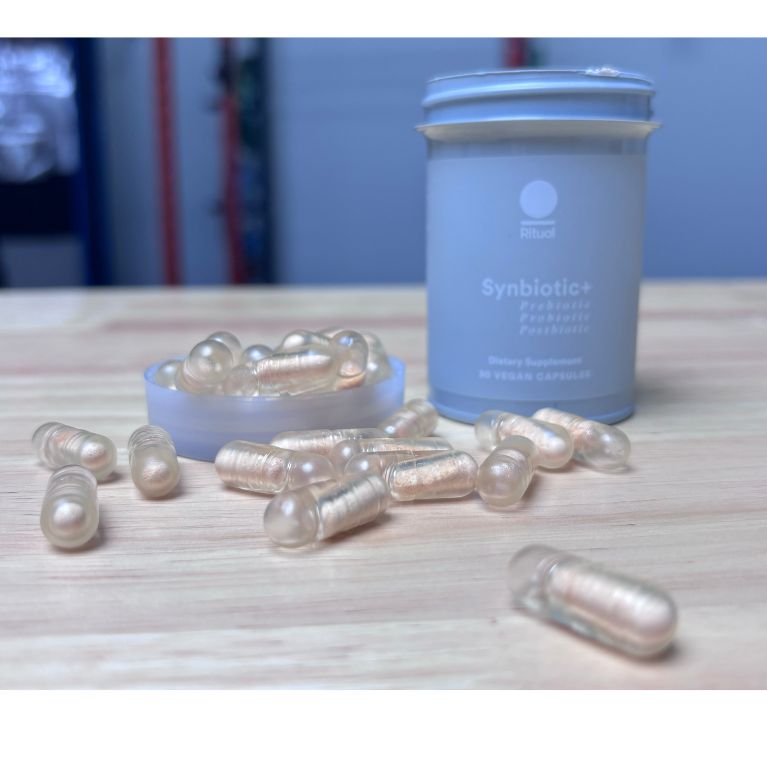
|
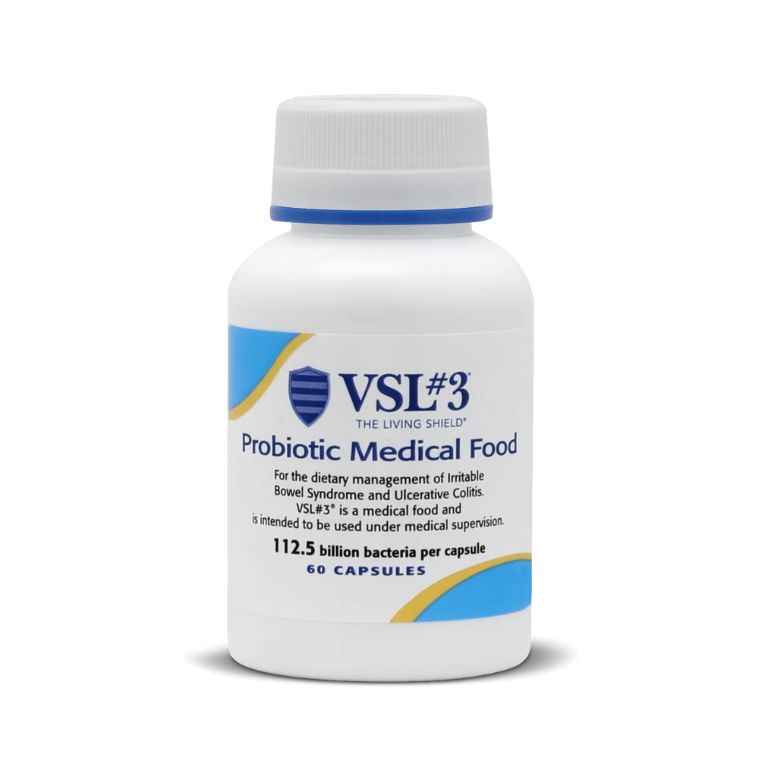
|
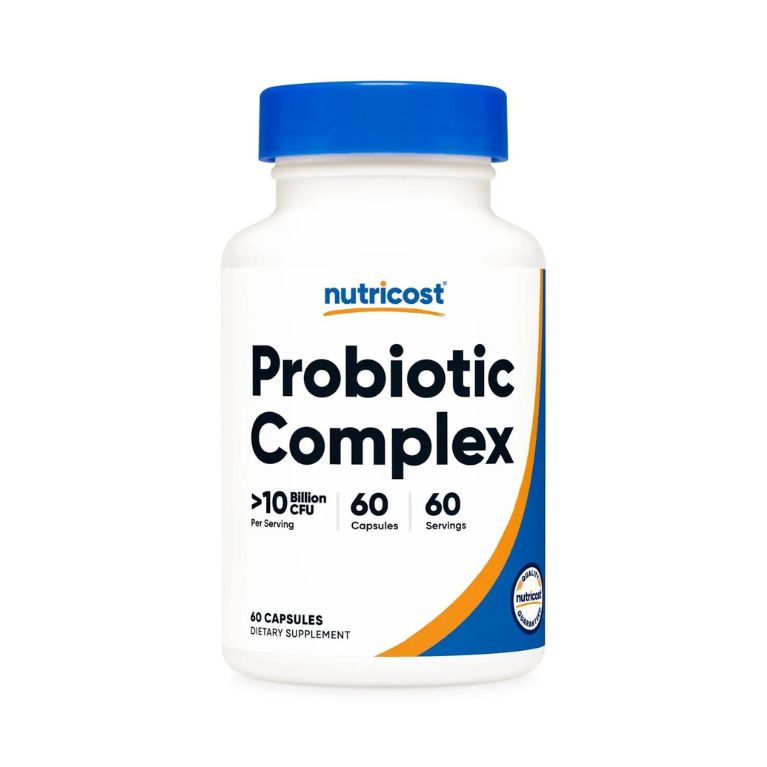
|
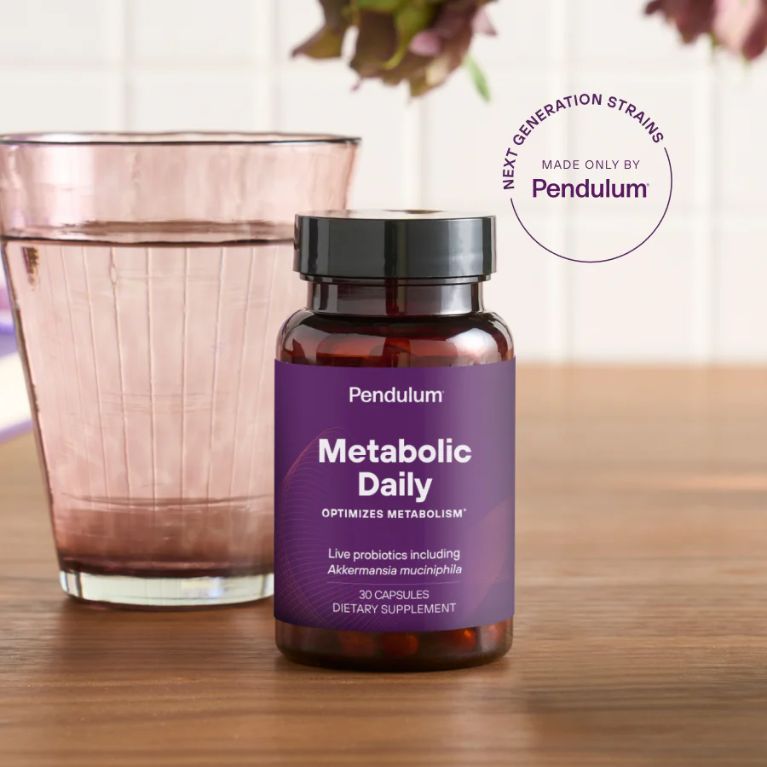
|
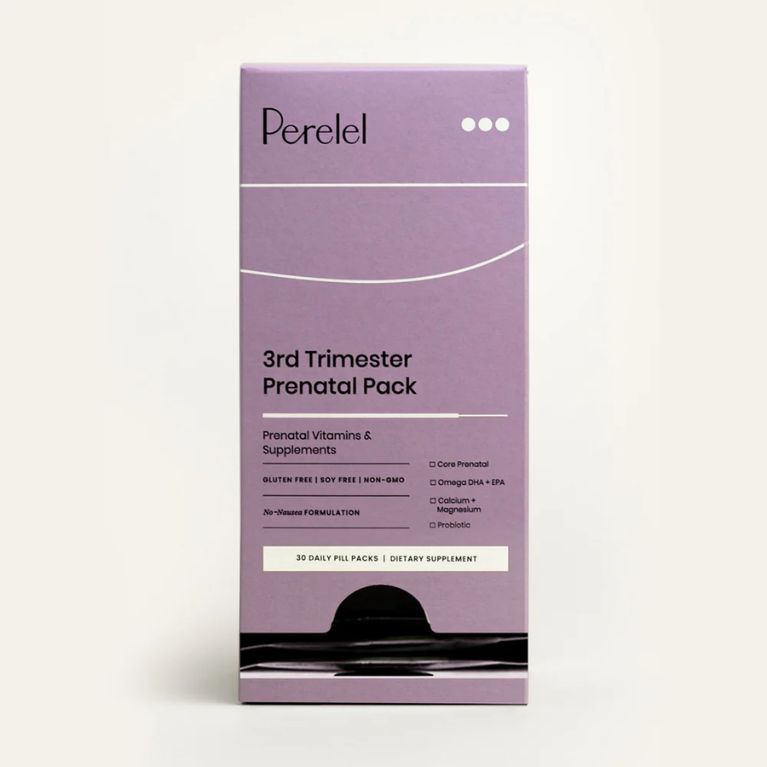
|
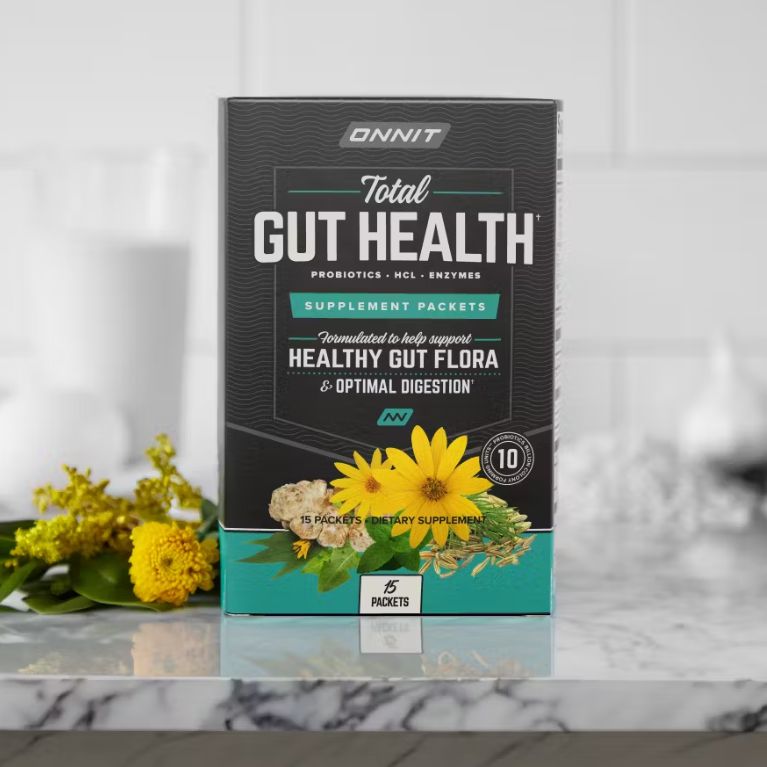
|
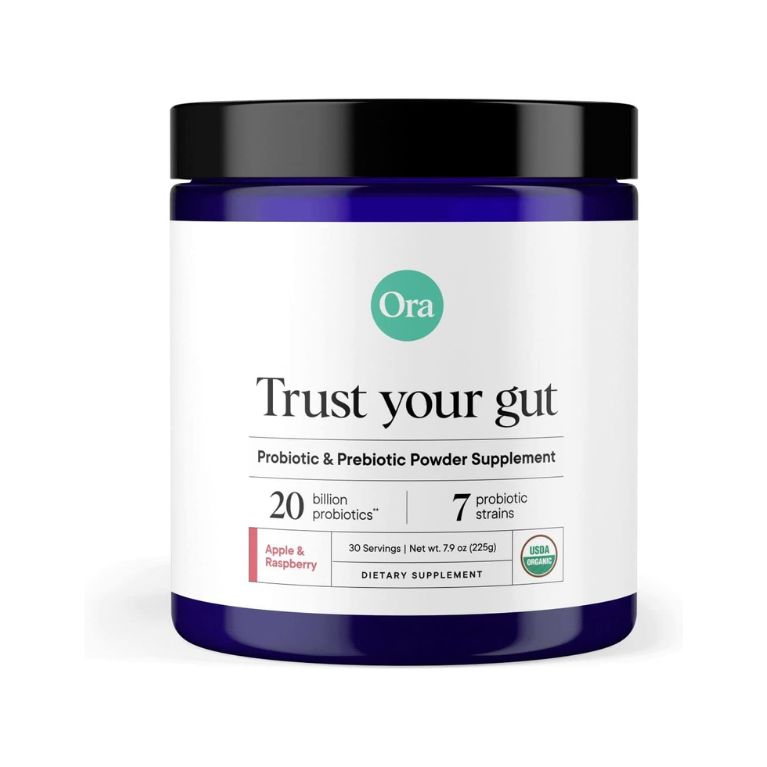
|
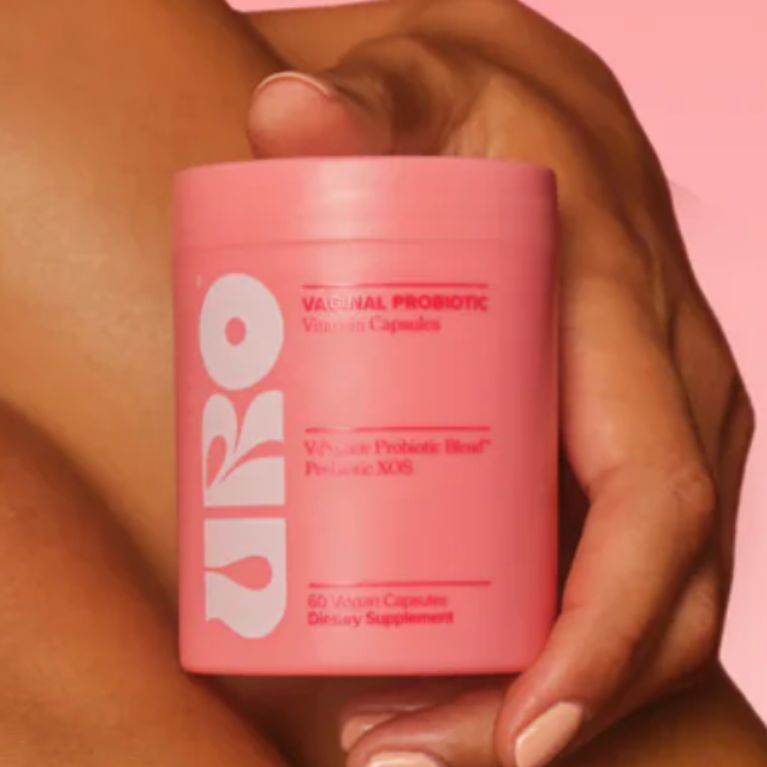
|
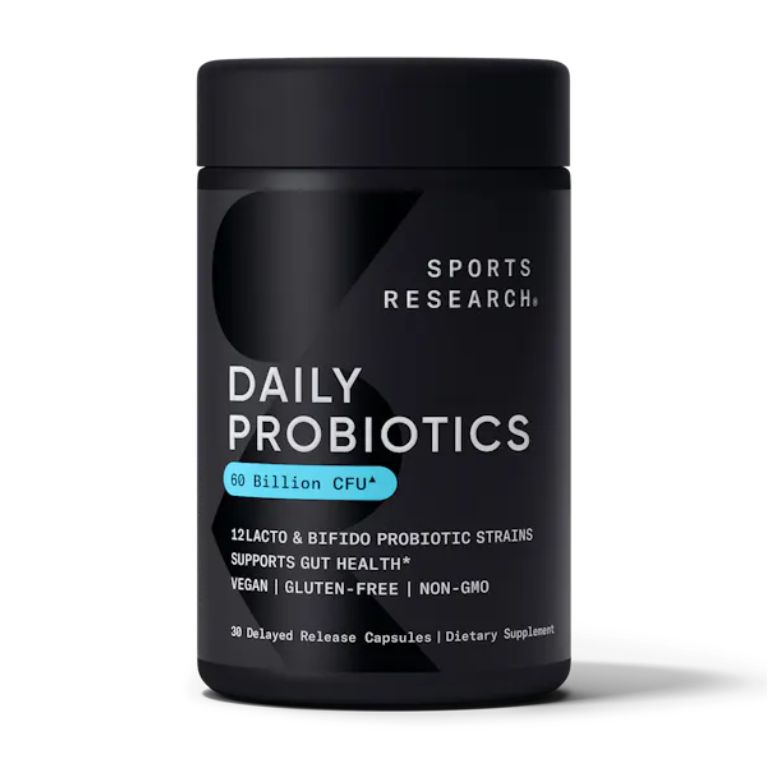
|
|
| Ritual Synbiotic+ | VSL #3 Capsules | Nutricost Probiotic Complex | Pendulum Metabolic Daily | Perelel Third Trimester Prenatal Pack | Onnit Total Gut Health | Ora Organic Trust Your Gut | O Positiv URO Vaginal Probiotic | Sports Research Daily Probiotics | |
| Rating | |||||||||
| Cost per serving | $1.80 | $2.20 | $0.25 or $0.42 | $2.63 | $1.94 | $1.50 | $1.37 | $1.06 | $0.83 |
| CFUs | 11 billion | 112.5 billion | 50 billion | 300 million AFUs | 5 billion | 15 billion | 20 billion | 5 billion | 60 billion |
| Probiotic strains | 2 | 8 | 10 | 5 | 12 | 8 | 7 | 4 | 12 |
| Form | Capsule | Capsule | Capsule | Capsule | Capsule | Capsule | Capsule | Capsule | Capsules |
| Dosage | 1 capsule | 2 capsules | 1 capsule | 1 capsule | 4 capsules, 1 softgel | 4 capsules | 2 capsules | 2 capsules | 1 capsule |
Best pre and probiotic for women: Ritual Synbiotic+
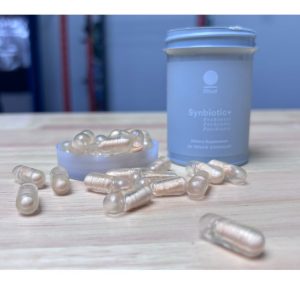

Key product features
What you should know
Ritual Synbiotic+ contains 11 billion CFUs of Lactobacillus rhamnosus and Bifidobacterium animalis ssp. lactis to support women’s health. Its formula also includes prebiotics and postbiotics to promote a healthy gut microbiome.
- Ritual Synbiotic+ contains prebiotics, probiotics, and postbiotics to support gut health.
- At $1.80 per serving, this is one of the higher-priced probiotics on the market.
- The probiotic strains in Ritual Synbiotic+ address key areas of women’s health, such as vaginal health, immune function, and digestive wellness.
Why we like Ritual Synbiotic+ as best pre and probiotic for women
Ritual Synbiotic+ stands out as the best pre and probiotic for women because its unique formula combines probiotic strains clinically studied to support women’s health. Plus, each delayed-release capsule contains prebiotics and postbiotics, whereas other supplements only contain probiotics. “Delayed-release” refers to a technology used in capsule formulation where the capsule is designed to dissolve or release its contents in the intestines rather than in the stomach. This delay in release allows the capsule to bypass the acidic environment of the stomach, which can potentially destroy or degrade the probiotics before they reach the intestines, where they are most effective.
Lactobacillus rhamnosus is clinically shown to help prevent and reduce the recurrence of bacterial vaginosis and urinary tract infections. Bifidobacterium animalis ssp. lactis (B. lactis) is documented in over 300 scientific papers, including over 130 human clinical studies. B. lactis supports a healthy gut microbiome, improves bowel function, and may help protect against common respiratory infections. (4, 5, 6)
Although these are clinically studied strains of probiotics, there isn’t a standardized dosage when it comes to colony-forming units (CFUs). Most probiotic supplements contain 1 to 10 billion CFU. Many studies on Lactobacillus rhamnosus use supplements with 10 billion CFU. Ritual Synbiotic+ contains 11 billion CFU, but it’s unclear how much of each probiotic strain is in the formula. (7)
This formula also contains prebiotics in the form of four strains of bacteriophages. Bacteriophages are viruses that infect and destroy harmful bacteria in the human gut. A therapeutic dose is 15 milligrams, the same amount in Ritual Synbiotic+. Tributyrin, a type of postbiotic, is a short-chain fatty acid that supports intestinal barrier function, reducing inflammation and promoting gut motility. (8, 9)
Synbiotic+ is vegan-friendly and comes in a delayed-release capsule. This is important because it gives the probiotics a better chance of reaching the colon, where they can colonize and provide health benefits. (10)
What to consider
At $1.80 per serving, Ritual Synbiotic+ is priced above average compared to other probiotics on the market. However, the 3-in-1 formula eliminates the need for other biotic supplements, making it more cost-effective. Plus, Synbiotic+ is third-party tested, non-GMO, vegan, and free of gluten and major allergens, so it’s worth the price for someone looking for a synbiotic formula.
What customers are saying
Customers on Amazon appreciate the high-quality ingredients, packaging aesthetics, and pleasant smell.
“Genuinely such an impressive little bottle of pre-, pro-, and post-biotics all in one and as a self-stable option not requiring refrigeration,” wrote verified Amazon customer Dovelette. “[It] makes taking all necessary ‘biotics’ a breeze instead of buying individual options that often come in ugly containers or require space in the fridge.”
A verified buyer on Amazon with the username Prime Suspect said Ritual Synbiotic+ is a good product and doesn’t give them stomach issues. “[I] found a pill that didn’t make me sick! Yay! These smell good, too. Recommend!”
Some of the less positive reviews on Amazon focused on the high price point and taste.
A 33-year-old verified Amazon buyer named Rochelle said she hates the taste but thinks the packaging and branding are nice. “Something about the mint taste makes this hard to swallow. Typically, mint things aren’t “food” to swallow like gum or toothpaste, so it’s very unintuitive,” she wrote.
Verified Amazon buyer Mary Frances Eberhart said she doesn’t normally write reviews, but Ritual Synbiotic+ gave her and her husband severe stomach issues. “I love their vitamins so I thought I’d give these a try. Very disappointed. Very expensive,” she commented.
Specs
| Serving size | 1 capsule |
| Number of servings | 30 |
| Price per serving | $1.80 |
| CFUs | 11 billion |
| Requires refrigeration | No |
| Third-party tested | Yes |
Best probiotic for women with IBS: VSL #3 Capsules
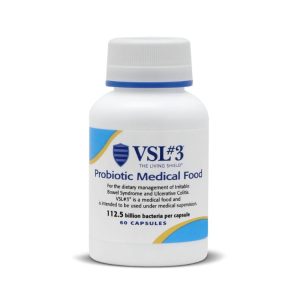

Key product features
What you should know
The VSL #3 Capsules formula includes well-studied probiotic strains, making it an excellent choice for women managing IBS symptoms.
- VSL #3 Capsules contain eight well-studied strains of probiotics and 112.5 billion CFUs per capsule.
- At $2.20 per serving, this probiotic is one of the pricier products on the market.
- This probiotic is formulated to help manage IBS and ulcerative colitis, so this product is best for those with IBS-specific concerns.
Why we like VSL #3 Capsules as best for women with IBS
Several strains in VSL #3 Capsules, such as Bifidobacterium lactis and Lacticaseibacillus acidophilus, are effective in alleviating IBS symptoms. These strains have demonstrated the ability to reduce abdominal pain, bloating, and irregular bowel habits commonly experienced by individuals with IBS, thus offering targeted relief. (11)
The comprehensive formula includes eight probiotic strains such as Streptococcus thermophilus, Bifidobacterium breve, Lactobacillus plantarum, Bifidobacterium lactis, and Lactobacillus acidophilus, and Lactobacillus paracasei. This diverse combination can reduce inflammation and improve intestinal barrier function, which are key for managing IBS symptoms. Lactiplantibacillus plantarum and Bifidobacterium lactis may also help in the fight against cardiovascular disease. Some research suggests a combination of Streptococcus thermophilus, can help improve IBS symptoms, including discomfort, in those diagnosed with IBS-D. (12, 13, 14, 15)
This high-potency formula contains 112.5 billion CFUs per capsule. According to the National Institutes of Health (NIH), many probiotics have up to 10 billion CFUs per dose, while some products, like this one, contain 50 billion or more. (7) However, the company doesn’t disclose the dose of each strain. Each serving is two capsules, but you can take up to four servings per day. Be sure to consult with your doctor about what dose is right for you and note each serving can be taken with cold, non-carbonated drinks and cannot be taken with food or hot liquids.
VSL #3 is an excellent choice for those with food allergies or intolerances because it’s nut-, dairy-, soy-, and gluten-free and is also vegan, kosher and Halal certified.
If you’re looking to manage IBS symptoms, check out our best probiotics for IBS.
What to consider
At $2.20 per serving, VSL #3 Capsule is one of the pricier probiotics we featured. However, considering the high potency and formulation for IBS, it may be worth it. The product is also HSA/FSA-eligible, and for cost-savings and free shipping you can order multipacks of up to four bottles. Additionally, we’d like to see third-party testing on this product, especially given the price. And, keep in mind this product must be refrigerated, so it’s not easy to travel with.
What customers are saying
With over 2,500 reviews on Amazon, VSL #3 Capsule customers rate this product 4.5 out of 5 stars. Users praise the fast shipping time and packaging that keeps the product cold during transit. According to many reviews, buyers purchased the product on the recommendation of their physicians.
Verified buyer B.T. Larkin says, “Well done. Arrived promptly and in properly cooled packaging. Thank you for doing it right.”
“This product was recommended by my physician with a warning about the high cost. Most probiotics are pricey, but do they work? This one truly does. It doesn’t ship ‘overnight,’ arrives in a box that has been kept cold. Would highly recommend this product.”
Username “I want one too,” Amazon
One common complaint—even among positive reviews—is the high cost.
“I have a lot of stomach problems with diarrhea after I eat. This has help regulate my bowel movements. I didn’t like the price, but it works well,” notes an anonymous verified Amazon buyer.
Specs
| Serving size | 2 capsules as needed (up to 4 times per day) |
| Number of servings | 30 |
| Price per serving | $2.20 |
| CFUs | 112.5 billion per capsule |
| Requires refrigeration | Yes |
| Third-party tested | No |
Best probiotic for women over 50: Nutricost Probiotic Complex
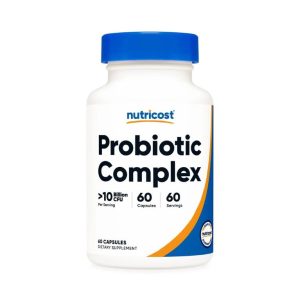

Key product features
What you should know
Nutricost Probiotic Complex combines multiple strains to help support a healthy gut microbiome and immune function.
- Nutricost Probiotic Complex is available in 10 billion or 50 billion CFUs, so you can choose your desired potency.
- The 10 billion CFUs option is $0.25 per serving, while the 50 billion CFUs option is $0.42 per serving. Both are some of the lowest-priced probiotics available.
- Budget-conscious women looking for a probiotic that supports gut health and well-being will appreciate the affordability.
Why we like Nutricost Probiotic Complex as best for women over 50
Nutricost Probiotic Complex is our pick for women over 50 because it includes multiple strains of Lactobacilli, such as L. acidophilus, L. rhamnosus, L. plantarum, and L. gasseri. The combination of these strains may help promote a balanced microbiome, may help support gut health when taking medication like antibiotics, improve immune function, alleviate symptoms of IBS, reduce inflammation, and aid weight management—all important for healthy aging. (4, 16, 1, 17)
This formula also includes Lactococcus lactis, which aids in lactose digestion and makes it easier to tolerate dairy products. (18) Saccharomyces boulardii may support healthy bowel movements and reduce the duration and severity of diarrhea. (19)
At just $0.25 per serving for the 10 billion CFUs option or $0.42 per serving for the 50 billion CFUs version, Nutricost Probiotic Complex is an affordable option for older women. Some probiotics cost less than $10 per bottle, but they usually only contain one strain. Nutricost’s probiotic contains multiple strains. Plus, Nutricost is made in a GMP-compliant facility, is third-party tested, and has a 60-day money-back guarantee. A subscription also offers an additional 20% savings.
Visit our full Nutricost Probiotic Complex review for more information.
What to consider
Since Nutricost doesn’t provide the CFUs per strain, it’s impossible to tell how effective the strains are in the formula. Plus, there’s no indication if the CFU count is based on the manufacture date or expiration date.
Nutricost Probiotic Complex is made with vegetarian capsules, but it’s not suitable for vegans. This probiotic requires refrigeration, which could be a hindrance for some users who forget to take supplements when they are out of sight or who travel often.
What customers are saying
On Amazon, the 50 billion CFU Probiotic Complex has 269 ratings. Customers regularly comment on the quality of the ingredients and exceptional value.
A verified Amazon buyer named Kia has been using Nutricost Probiotic Complex for over four years. “I did think [about] purchasing something cheaper, but my body is used to these particular probiotics, so I’ll continue to buy them. I buy them in bulk, so I don’t run out! Great product,” she wrote.
“These work very well for me,” said an Amazon customer with the username Cph Milwaukee. “I have gluten allergies deriving from GMOs. This product helps to keep me regular.”
However, some Amazon customers weren’t sold on the effectiveness.
“I’ve used other brands that have an immediate improvement on my digestive process. This brand just doesn’t do that,” wrote verified Amazon buyer Eric P.
Specs
| Serving size | 1 capsule |
| Number of servings | 60 |
| Price per serving | $0.25 or $0.42 |
| CFUs | 10 or 50 billion |
| Requires refrigeration | Yes |
| Third-party tested | Yes |
Best probiotic for weight loss: Pendulum Metabolic Daily
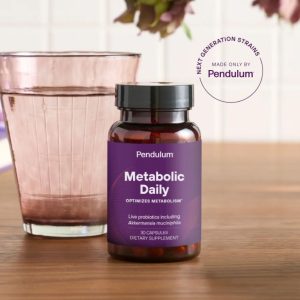

Key product features
What you should know
Pendulum Metabolic Daily is formulated with probiotics that were discovered in the last 20 years, including Akkermansia.
- Pendulum Metabolic Daily contains several probiotic strains to support your gut microbiome, which the brand says will help optimize your metabolism.
- At $2.63 per serving, this is one of the most expensive probiotics for women on our list.
- This product is formulated to support weight management, so it may be best for those with weight loss goals.
Why we like Pendulum Metabolic Daily as best for weight loss
The probiotic strains in Pendulum Metabolic Daily may help support weight loss by promoting healthy gut microbiota, improving digestion and nutrient absorption, enhancing metabolic health, and reducing inflammation. The brand claims that three of the probiotics in the blend—Akkermansia muciniphila, Anaerobutyricum hallii, and Clostridium beijerinckii—are sold only by Pendulum.
Since Akkermansia was only discovered in 2004, more research is needed. However, early clinical trials in animals and humans show there may be a relationship with higher levels of Akkermansia muciniphila in the gut and lower rates of obesity, inflammation, and metabolic disorders. (20)
The one-capsule serving contains 300 million AFUs, which is a measure that includes both viable and non-living probiotics. Pendulum Metabolic Daily also includes Clostridium butyricum, Clostridium beijerinckii, and Bifidobacterium infantis.
Strains of Clostridium, like the ones found in this product, may help support gut health and reduce inflammation. It also may help reduce symptoms of IBS and inflammatory bowel disease. (21, 22) Bifidobacterium infantis can help lower inflammation, especially in those with ulcerative colitis and psoriasis. (23)
Of course, individual responses to probiotics may vary, and lifestyle factors such as diet and exercise should also be considered in any weight loss regimen.
Related: The best probiotics for weight loss
What to consider
At $2.63 per serving, this is one of the most expensive options on the list. You can bring down the cost by purchasing a one-, three-, or six-month supply. Third-party testing results are not available, and at this price point, we’d like to see certifications such as IPRO or NSF.
It’s important to note studies that correlate probiotics with weight loss have typically been done in obese or overweight populations, and lifestyle changes like diet and exercise also often factor into the results; so a probiotic alone is not going to lead to weight loss.
What customers are saying
Pendulum Metabolic Daily has over 540 reviews on Amazon with an average rating of 4.1 stars.
Customers who rate the product highly praise its benefits and effectiveness. “It does work. It helps me to manage my IBS symptoms; I have much less diarrhea now, sometimes none,” said verified Amazon reviewer Angela M.
“This probiotic, along with the other Akkermansia products greatly improve digestion, they work exactly as the company states. They are easy to take! Highly recommend!”
Sherri1, Amazon
However, some customers report the product doesn’t work or causes uncomfortable GI side effects. “Was hoping that it would help regulate my GI symptoms and help sensitivity to foods, instead I had worse symptoms,” said verified Amazon customer Helena. And reviewer Dale D. said “I used the whole bottle before leaving this review and I noticed zero change in anything.”
Specs
| Serving size | 1 capsule |
| Number of servings | 30 |
| Price per serving | $2.63 |
| AFUs | 300 million |
| Requires refrigeration | No |
| Third-party tested | No |
Best probiotic for pregnant women: Perelel Third Trimester Prenatal Pack
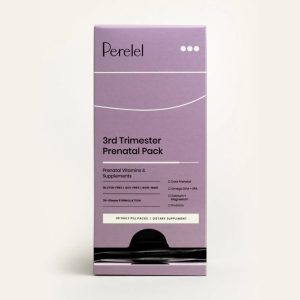

Key product features
What you should know
Perelel Third Trimester Prenatal Pack is designed to provide nutrients including vitamins, omega-3s, and probiotics to support the health of those in their third trimester.
- This supplement is a five-capsule pack to support the health of the pregnant person and their growing baby.
- At $1.94 per serving, this product is one of the higher-priced options on our list. However, the supplement offers more than just probiotics and provides specific support for pregnancy.
- Perelel Third Trimester Prenatal Pack is formulated for those in their third trimester, with specific vitamins, minerals, and probiotics to aid in fetal skeletal development, support gut health, and more.
Why we like Perelel Third Trimester Prenatal Pack as best for pregnant women
The Perelel Third Trimester Prenatal Pack includes a five-pill serving of nutrients to support the third trimester of pregnancy. This includes two capsules with prenatal vitamins, including vitamin A, vitamin D, and iron, one omega DHA + EPA softgel, one calcium and magnesium capsule, and one probiotic capsule with 5 billion CFUs.
Some of the probiotic strains in the Perelel Third Trimester Prenatal Pack include Lactobacillus acidophilus, Lactobacillus rhamnosus, and Bifidobacterium longum, which support maternal gut health during pregnancy. Maintaining a healthy gut microbiome is essential for nutrient absorption, immune function, and overall well-being. All of these are crucial during pregnancy to support the health of both the mother and the developing fetus. (24)
Several of the 12 probiotic strains in the blend, such as Lactobacillus rhamnosus and Lactobacillus reuteri, may support immune function. During pregnancy, the immune system undergoes adaptations to accommodate the growing fetus. Supporting immune health with probiotics can help pregnant women maintain their immune defenses against infections and illnesses. ( 25)
Probiotic strains like Lactobacillus acidophilus and Bifidobacterium longum may help alleviate gastrointestinal issues, such as bloating, constipation, and diarrhea. These digestive ailments are common concerns during pregnancy. By promoting gut health and regular bowel movements, this probiotic may contribute to maternal comfort and well-being. (26, 19)
At $1.94 per serving, this is one of the more expensive products on our list, but since it’s formulated for pregnancy, it may be a worthwhile purchase to add to your routine for a short time.
What to consider:
If you are earlier in your pregnancy, you may need to opt for a different product formulated for either the first or second trimester. All Perelel prenatal products come in a pack with four capsules and one softgel, so if you have trouble taking pills this supplement may not work for you. And, the probiotic pill is formulated as a blend, so it’s not clear how much of each strain is in the formulation.
What customers are saying
Perelel Third Trimester Prenatal Pack has 43 reviews on Amazon with an average rating of 4 stars. Customers like the formulation of nutrients and benefits they get when taking the supplement.
“Perelel’s vitamins are gentle on the stomach, which is a godsend for someone like me who struggles with nausea. Plus, knowing that I’m getting the essential nutrients necessary for my baby’s development gives me peace of mind,” said verified Amazon buyer Sara.
“They helped me feel confident that I was getting all of the important vitamins, minerals and nutrients I needed for a healthy baby. I started getting leg cramps in the middle of the night at the start of my third trimester and after switching to Perelel’s pack those went away.”
Rachel H., Amazon
However, some customers have issues with order time or packages coming damaged, or have difficulty taking five pills.
“I’ve always ordered from the Perelel [site] but I was in need of getting my items a little faster so decided to go through Amazon. The box arrived squished & with all pill packets everywhere,” said Lourdes G., verified Amazon customer.
Specs
| Serving size | 4 capsules, 1 softgel |
| Number of servings | 30 |
| Price per serving | $1.94 |
| CFUs | 5 billion |
| Requires refrigeration | No |
| Third-party tested | Yes |
Best probiotic for women’s gut health: Onnit Total Gut Health
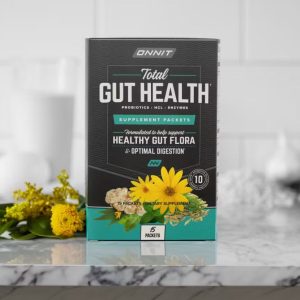

Key product features
What you should know
Onnit Total Gut Health is a probiotic and prebiotic supplement designed to support gut health and help ease bloating.
- Onnit Total Gut Health is formulated with a prebiotic and herbal blend, a probiotic blend, and what Onnit calls a “DigesTech Powder Blend.”
- Each four-capsule serving costs $1.50, making it one of the lower priced options on our list.
- This blend includes digestive enzymes, prebiotics, and probiotics, making it a good choice for those looking for overall gut health support.
Why we like Onnit Total Gut Health as best probiotic for gut health
Onnit Total Gut Health is our pick for best probiotic for women’s gut health due to its inclusion of prebiotics, probiotics, and other ingredients that may help support digestion. Each four-capsule serving contains 15 billion CFUs of probiotics including Saccharomyces boulardii. This is a probiotic yeast that is often used to help treat digestive issues such as GI upset and diarrhea. It also may be helpful in reducing painful IBS symptoms and may even help prevent traveler’s diarrhea. (27, 28)
The DigesTech Powder Blend™ includes digestive enzymes like pepsin, which helps with digestion by breaking down proteins into amino acids. (29)
The Onnit Probiotic Blend™ is formulated with 10 billion CFUs and includes B. subtilis, B. coagulans, L.rhamnosus, L. acidophilus, B. infantis, L.plantarum, and B. lactis. These strains are known to help support gut health by reducing IBS symptoms like abdominal pain and bloating. (30, 31) B. lactis is one of the most-studied probiotic strains and supports the gut barrier. (32) Some research shows L. plantarum may help improve symptoms of neurodegenerative diseases, such as Alzheimer’s and Parkinson’s. (33)
At $1.50 per serving, this is one of the lower-priced products on our list. It may be a good option for those looking for something formulated for digestive support, to help reduce bloating, or to relieve symptoms of diarrhea.
What to consider
This product is formulated with three different proprietary blends, so there isn’t a lot of transparency on the amounts of each probiotic strain or other ingredients in the product. We’d like to see third-party testing and more ingredient transparency from the brand for this product.
What customers are saying
Onnit Total Gut Health has over 340 reviews on Amazon with an average rating of 4.4. Many customers report the supplement helps them with digestion and helps reduce the feeling of bloat.
“The digestive enzymes in this really help break my food down and feel less bloated. The mix of pre- and probiotics have done a great job of settling my stomach as well,” says Amazon reviewer MaliceFox.
“Shipping was fast and no issues. The packets are very easy to grab before leaving the house, all pills in one package. I did notice easier digestion on larger meals and did not feel sluggish during my next training event.”
SS, Amazon
However, some reviewers didn’t notice much of a difference when using the product and felt it was expensive. “ I feel as though I’m pretty in tune with my body and have to say that I noticed no significant changes one way or the other. This was after going through 3 complete boxes,” said Amazon buyer Tranzfr.
Specs
| Serving size | 4 capsules |
| Number of servings | 30 |
| Price per serving | $1.50 |
| CFUs | 15 billion |
| Requires refrigeration | No |
| Third-party tested | No |
Best vegan probiotic for women: Ora Organic Trust Your Gut
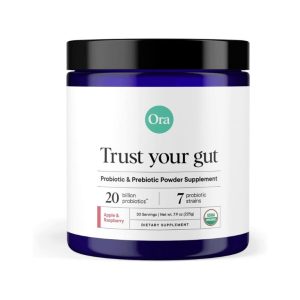

Key product features
What you should know
Ora Organic Trust Your Gut is a daily supplement that contains probiotics and prebiotics designed to help support gut health. This plant-based, vegan capsule is suitable for those with dietary restrictions.
- Ora Organic Trust Your Gut contains 16 billion CFUs of probiotic strains and prebiotics from Organic Jerusalem Artichoke Inulin.
- Each two-capsule serving costs $1.37, which is fairly affordable considering other options on the market.
- This supplement is best for those looking to support gut health and reduce bloating or those who follow a vegan diet.
Why we like Ora Organic Trust Your Gut as best vegan probiotic
We like Ora Organic Trust Your Gut Daily Essential Probiotic + Prebiotic as the best vegan probiotic for women for a variety of reasons. The supplement contains 16 million CFUs of probiotic strains plant-based sources and organic prebiotics from Jerusalem artichoke inulin
This supplement contains a variety of numbered probiotic strains including Lactobacillus acidophilus DDS-1, Bifidobacterium lactis UABla-12, Lactobacillus reuteri UALre-16, and Bifidobacterium bifidum UABb-10. Lactobacillus acidophilus DDS-1 and Bifidobacterium lactis UABla-12 may help reduce abdominal pain and bowel movements in those with IBS. (34) Additionally, Lactobacillus acidophilus DDS-1 and Bifidobacterium lactis UABla-12 may help support the immune system. (34)
The prebiotics, which help to support good gut bacteria, come from organic Jerusalem artichoke inulin. Inulin is a prebiotic fiber that can help support gut health, potentially helping to reduce constipation and boosting mineral absorption. (35)
Since the ingredients are plant-based and it’s made with a vegan capsule, this probiotic supplement is appropriate for most dietary needs, including vegans and vegetarians. Another benefit of this product is it doesn’t require refrigeration, so it’s easy to store and also bring with you if you’re traveling.
At $1.37 per serving, this supplement comes in at the lower end of our list. For the price, we like that it contains 16 billion CFUs of probiotics as well as prebiotics to support gut health.
What to consider
One drawback of this supplement’s formulation is that it’s not clear on the amount of each probiotic strain—the strains are listed as “Ora Probiotic Blend” alongside the total cultures. Additionally, there are no third-party certifications, so if you’re concerned about the purity of the ingredients in the product, you may want to choose a different one.
What customers are saying
On Amazon, Ora Organic Trust Your Gut Daily Essential Probiotic + Prebiotic has over 2,700 reviews and 4.3 out of 5 stars.
Customers report this supplement helps with gut issues and bloating and supports regular bowel movements.
“Coming from someone that has IBS this is amazing. I definitely noticed a difference in the first three days of using this. It definitely keeps me balanced out. It takes some of that feeling bloated away. Definitely if you have stomach issues it’s worth purchasing and trying it out for yourself. It definitely worked for me and I love keeping this handy. Hope this helps.”
Amanda M., Amazon
However, some Amazon customers report issues with product quality and consistency and issues with the product being close to the expiration date.
“I love this product, unfortunately the expiration date before finished the bottle. I bought it [at the] end [of] August and it will be expired September. I hope they review the expiration date before shipping,” wrote verified Amazon buyer Gus G.
Specs
| Serving size | 2 capsules |
| Number of servings | 30 |
| Price per serving | $1.37 |
| CFUs | 16 billion |
| Requires refrigeration | No |
| Third-party tested | Yes |
Best probiotic for women’s vaginal health: O Positiv URO Vaginal Probiotic
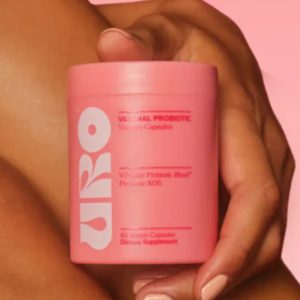

Key product features
What you should know
O Positiv URO Vaginal Probiotic is made with probiotics that are clinically proven to support vaginal health.
- This supplement contains four Lactobacillus strains of probiotics that are well-researched and known to support vaginal health.
- At $1.06 per serving, this is one of the lower priced supplements on our list.
- Since the CFUs in this product are lower than others on our list, this is best for those who are looking to specifically support their vaginal health, and who aren’t concerned about getting a lot of gut health support.
Why we like O Positiv URO Vaginal Probiotic as best for vaginal health
O Positiv URO Vaginal Probiotic contains several strains of vaginal-health supporting probiotics, including Lactobacillus rhamnosus and Lactobacillus reuteri. Research shows these strains can help slow the growth of pathogenic bacteria and reduce the risk of vaginal infections, including bacterial vaginosis and yeast infections. (36)
The formula includes a variety of Lactobacillus strains, which are the predominant bacteria in the vagina. Lactobacillus plays a crucial role in maintaining vaginal pH, producing antimicrobial compounds, and preventing the overgrowth of harmful pathogens. By replenishing and maintaining a diverse array of Lactobacillus species, this probiotic blend may promote vaginal flora balance and overall vaginal health. (37)
The product also includes xylooligosaccharides (XOS), which are prebiotic sugars that serve as food for the probiotics.
Each two-capsule serving is vegan-friendly and contains 5 billion CFUs.
The brand notes it may take about eight weeks to see benefits, so you’ll need to stick with it. This women’s probiotic is one of the most affordable on our list at $1.06 per serving. The company also provides a 60-day money-back guarantee.
What to consider
This probiotic is formulated with a blend, so we don’t know how much of each strain is in the product. Additionally, the product contains 5 billion CFUs, which is lower than other options on our list. If you have gut-specific concerns, you may want to opt for an option with higher CFUs.
What customers are saying
O Positiv URO Vaginal Probiotic Capsules have over 4,500 ratings on Amazon with an average of 4.5 out of 5 stars. Reviewers like that the product doesn’t have a taste and find the capsules easy to take.
“There is no taste which is good, high quality so far so good on effectiveness it’s small and compact, fits right in your purse or travel bag true to size very easy to use, just take with water,” wrote Angela P. on Amazon.
“I feel more confident and healthy overall. I work out a lot and generate a lot of warmth and moisture “down there” — these really helped me regenerate a healthy microbiome after trying so many different things. I noticed results after just 1 week. Everything feels and smells normal now and I never had to use antibiotics!”
S.K., Amazon
While most reviews are positive, some women said they experienced headaches, dry mouth, UTIs, high blood pressure, or changes to their menstrual cycle while taking this supplement.
“I was fine for the first few days but by day 5, I started getting a headache. By day 6 the headache was constant. I had to take pain pills. By day seven, the headache was unbearable. It was hard for me to focus. I felt like the top of my head was burning and the back of my neck was killing me. I took a blood pressure test and could not believe how high my blood pressure was. I stopped taking URO the same day. A few days later my cycle came on early,” wrote an anonymous Amazon customer.
Specs
| Serving size | 2 capsules |
| Number of servings | 30 |
| Price per serving | $1.06 |
| CFUs | 5 billion |
| Requires refrigeration | No |
| Third-party tested | Yes |
Best daily probiotic for women: Sports Research Daily Probiotics
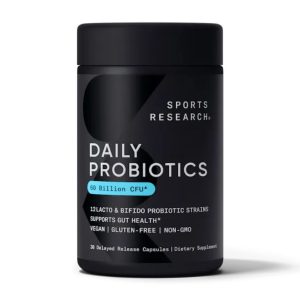

Key product features
What you should know
Sports Research Daily Probiotics stand out for their diverse blend of probiotic strains, commitment to efficacy, and high-quality, non-GMO ingredients.
- The formula includes 12 lactobacilli and bifidobacteria probiotic strains in a dose of 60 billion CFUs per serving.
- At $0.83 per serving, Sports Research Daily Probiotics is priced below average and provides a lot of value for your money.
- Sports Research Daily Probiotics is a high-quality, non-GMO probiotic for women who want to maintain optimal gut health.
Why we like Sports Research Daily as best daily
Sports Research Daily Probiotics stands out for its diverse blend of probiotic strains and its commitment to quality and efficacy. The company carefully selects each strain based on scientific research to ensure maximum benefit for digestive and immune health. This supplement is non-GMO verified and vegan certified.
Sports Research Daily Probiotics contains Lactobacilli and Bifidobacteria probiotic strains that can reduce the symptoms associated with IBS, such as bloating, abdominal pain, and constipation. They may also support immune, gastrointestinal, and female reproductive health in healthy adults. However, more research is needed. (11, 38)
The supplement also contains a fiber inulin blend, which serves as a prebiotic. This synergistic combination supports optimal gut health, aids nutrient absorption, and strengthens the immune system. Studies have shown that inulin may help with fat metabolism, weight loss, and blood sugar control. It may even reduce the risk of colon cancer and relieve depression. (3)
Sports Research Daily Probiotics is shelf-stable and doesn’t require refrigeration, making it convenient for on-the-go use. The delayed-release capsule allows the probiotics to reach the colon intact. Additionally, the 60 billion CFUs is guaranteed until the expiration date. (10)
At $0.83 per serving, this product is below the average cost of high-quality supplements in this category, making it a great option for daily intake. Sports Research Daily Probiotics is manufactured in a cGMP-compliant facility following strict quality control standards, including third-party testing for purity and potency. It can be a valuable addition to your supplement stack.
Read our full Sports Research Daily Probiotics review for additional information.
What customers are saying
Sports Research Daily Probiotics has over 5,000 ratings on Amazon. Customers regularly comment on the quality, effectiveness, convenience, and value.
“I just purchased this product recently and have only been using it for one week however, I do notice a difference when I am taking the product, and I don’t have the normal stomach bloat or extreme feeling of fullness once I take this product,” wrote verified Amazon buyer Quentin D Lewis.
A verified Amazon buyer with the username AnalogCyan says these daily probiotics are a true lifesaver for their easily irritable gut. “After struggling with digestive issues for a long time, I finally found relief with these capsules,” they wrote. “They’ve not only tamed my gut but also significantly improved my digestive health.”
A few customers experienced an upset stomach or flatulence when taking these probiotics. Others commented that there was no improvement in their digestive health.
“I’ve used it multiple times now, and every time, my stomach starts to hurt. This is the only one that’s happened with,” wrote verified buyer E.J. Kukoly.
Specs
| Serving size | 1 capsule |
| Number of servings | 30 |
| Price per serving | $0.83 |
| CFUs | 60 billion |
| Requires refrigeration | No |
| Third-party tested | Yes |
How we score the best probiotics for women
Every probiotic we review is rated across six primary categories. Each category is assigned a different percentage weight of the total score based on its relative importance when considering whether or not you should purchase a plant-protein product. Plant protein powders can also earn bonus credits that boost the overall rating for third-party testing credentials from NSF, Labdoor, and more.
You can check out our complete probiotic testing methodology here.
Exclusion of proprietary blends—25%
There are many different probiotic strains, each designed to address a specific health goal for women. Avoiding proprietary blends is crucial for transparency, allowing consumers to know exactly what and how much of each ingredient is included, ensuring a better assessment of the product’s effectiveness and safety.
Cultures contained—25%
Identifies the specific strains of probiotics or beneficial bacteria present in the product. The importance lies in the fact that different strains offer distinct health benefits, such as improved gut health, enhanced immunity, or better digestion.
Here are a few we consider:
- Lactobacillus rhamnosus
- Lactobacillus plantarum
- Bifidobacterium lactis
- Bifidobacterium longum
- Saccharomyces boulardii
- Streptococcus thermophilus
Whether they’re encapsulated with a food source—20%
We determine if the probiotic cultures are paired with a prebiotic or other food source that nourishes the bacteria during digestion. This can enhance the survival rate of probiotics as they navigate through the digestive system, ensuring they reach the intestines effectively.
Whether cultures are alive—15%
This examines whether the probiotic cultures in the product are alive and viable at the time of consumption, which are necessary for the probiotics to exert their beneficial effects in the gut. The effectiveness of the product often depends on the survival of these cultures through processing and storage.
Colony forming units (CFUs) at end of shelf life—10%
CFUs represent the number of live microorganisms, typically bacteria, present in a probiotic supplement at the end of its shelf life. We like to see probiotics that provide at least 20 billion or more CFUs, though these are the ranges we consider:
- Under 1 billion
- 1 Billion to 4.9 Billion
- 5 Billion to 9.9 Billion
- 10 Billion to 19.9 Billion
- 20 Billion+
Form—5%
The form is important because it can affect how easily the product is consumed, absorbed, and stored. Different forms may also have varying shelf lives and convenience factors for the user.
We evaluate:
- Capsules
- Tablets
- Powders
- Liquids
Benefits of probiotics for women
Probiotics may offer many general health benefits, such as improving the gut microbiome, immune function, and gastrointestinal health. Some probiotics may also offer benefits specific to women, such as improved vaginal health.
Alleviating constipation and diarrhea
Research has shown that certain strains of probiotics may help relieve constipation due to gut dysbiosis, including L. acidophilus, L. rhamnosus, L. reuteri, L. plantarum, and Bifidobacterium animalis subsp. Lactis., Streptococcus salivarius subsp. thermophilus, Enterococcus faecium, Lacticaseibacillus paracasei, L. bulgaricus, and Streptococcus thermophilus. (26) Similarly, some probiotic strains may also help treat diarrhea. Saccharomyces boulardii is commonly used to treat diarrhea and has been clinically shown to shorten its duration. (19)
Ultimately, the effectiveness of using probiotics to treat constipation or diarrhea can depend on the individual as well as the causes.
Reducing gas and bloating
Lactobacillus acidophilus, Lactobacillus plantarum, and Bifidobacterium lactis may help reduce gas and bloating. (1)
Managing IBS symptoms
Research has shown that probiotics can relieve a variety of IBS symptoms, including constipation, bloating, diarrhea, abdominal pain, stool consistency, and more. (1) Certain probiotic strains appear to work better for managing IBS symptoms, and their effectiveness can vary by person as there are several types of IBS and numerous causes.
Bacillus coagulans strain LBSC (DSM17654) has shown to be particularly effective at managing a variety of IBS symptoms, especially reducing the number of bowel movements. Lactobacillus plantarum may help alleviate gas and abdominal pain from IBS. Lactobacilli and Bifidobacterium strains may help with IBS constipation. Bifidobacterium bifidum may also help with IBS bloating, pain, digestion, and urgency. (1)
Supporting vaginal health
Lactobacillus makes up 95% of the microbiota found in a healthy vagina and plays an important role in maintaining that health, through preventing the growth of bacteria and viruses and balancing the pH level. (37) Taking certain probiotics may help with treating bacterial vaginosis, yeast infections, and UTIs, slowing the progression of cervical cancer, and balancing the vagina’s microenvironment. (37)
Gynecologists may recommend probiotic strains like Lactobacillus acidophilus, Lactobacillus rhamnosus, and Lactobacillus reuteri to support vaginal health. Lactobacillus rhamnosus is clinically shown to help prevent bacterial vaginosis and urinary tract infections.
Helping improve mental health conditions
Researchers have found connections between gut health and mental health, known as the gut-brain axis. (39) It’s hypothesized that improving the gut microbiome may help improve mental health conditions such as depression and anxiety. Some studies have shown that probiotics may help with mental health conditions, though more research is needed. (40)
Who should take women’s probiotics?
Women who are looking for relief from constipation, gas, bloating, diarrhea, or IBS, or simply looking to improve the health of their gut microbiome may benefit from taking a probiotic. Some research has shown that probiotics may also help with mental health conditions, though more research is needed. (40)
Women’s probiotics may be formulated with probiotic strains that are proven to help with women-specific issues, such as helping treat bacterial vaginosis and UTIs, preventing the growth of vaginal bacteria and viruses, slowing the progression of cervical cancer, and balancing the vagina’s microenvironment and pH level. (37)
Who should avoid taking women’s probiotics?
People who are immunocompromised or have underlying health conditions may want to avoid taking probiotics, as they could possibly cause infections. It also may not be appropriate to take probiotics with certain medications. When in doubt, it’s best to speak with your doctor before taking probiotics. Some people may also be sensitive to probiotics or certain strains.
FAQs
What are the side effects of probiotics for women?
Probiotics are generally safe for most individuals. However, some women may experience mild side effects, including digestive discomfort, bloating, or diarrhea. In rare cases, individuals may be allergic to specific strains of probiotics or other ingredients in the supplement, leading to symptoms such as itching, swelling, or hives. In immunocompromised individuals or those with underlying health conditions, probiotics can potentially cause infections, although this is rare. Some medications may interact with probiotics. Always check with your doctor before starting probiotic supplementation.
How often should women take a probiotic?
There are still many unknowns about the safety and effectiveness of probiotic supplementation. For this reason, the optimal frequency and type of probiotic you supplement with will vary based on your individual health needs. It’s best to consult with a healthcare professional for personalized recommendations or follow the dosage instructions provided by the manufacturer.
What is a good probiotic for women with bloating?
Strains like Lactobacillus acidophilus, Lactobacillus plantarum, and Bifidobacterium lactis are known to support digestive health and may reduce bloating. Look for a probiotic with multiple strains and high potency to ensure effectiveness in alleviating bloating symptoms. Probiotic supplements that include prebiotic fibers may further support gut health and reduce bloating.
What probiotics do gynecologists recommend?
Gynecologists often recommend probiotics containing specific strains like Lactobacillus acidophilus, Lactobacillus rhamnosus, and Lactobacillus reuteri, which have been shown to promote vaginal health. These probiotics may help prevent or alleviate conditions such as bacterial vaginosis, UTIs, and yeast infections. Consult with a healthcare professional to determine the best probiotic for your individual needs.
Are probiotics safe to take while pregnant or breastfeeding?
Probiotics are generally safe to take while pregnant or breastfeeding, though you should only do so under the supervision of your doctor. Look for prenatal probiotics that are formulated with appropriate probiotic strains and doses, are made by reputable companies that conduct third-party testing, and are made in GMP or cGMP certified facilities to ensure quality.
Should women take a probiotic everyday?
Yes, it is generally safe for women to take a probiotic every day unless advised otherwise by their doctor. Certain strains of probiotics like Lactobacillus acidophilus, Lactobacillus rhamnosus, and Lactobacillus reuteri have been shown to help with vaginal health. Everyone reacts differently to probiotics, so it may be best to start at a lower dose, or CFU count, and try different probiotic strains to see what works best. Overall, it’s best to take a probiotic from a reputable company that conducts third-party testing, that’s made in a GMP or cGMP certified facility to ensure quality.
These statements have not been evaluated by the Food and Drug Administration. These products are not intended to diagnose, treat, cure, or prevent any diseases.
Our experts
Dr. Raj Dasgupta, MD, FACP, FCCP, FAASM
Quadruple-board certified in pulmonary, sleep, internal, and critical care medicine. An active clinical researcher, Dr. Raj currently practices at the University of Southern California, where he’s been awarded the Excellence in Teaching award six years in a row. He’s also an associate professor of clinical medicine, assistant program director of the internal medicine residency program, and the associate program director of the sleep medicine fellowship at USC.
Dr. Robert Wildman, Ph.D., RD, LD, CISSN, FISSN
“Dr. Rob” is a globally renowned exercise, fitness, and nutrition expert who speaks around the world on exercise and sport nutrition, and continues to work with professional and elite athletes to achieve their highest level of performance as well as health and fitness. Rob received his Ph.D. from The Ohio State University, earned his MS from Florida State University, and earned his BS from the University of Pittsburgh. He is also a registered and licensed dietitian.
Amanda Dvorak
Amanda Dvorak is a Fortune Recommends writer and editor. A garage gym owner who is passionate about working out and healthy living, she has four years of experience writing product reviews for fitness and nutrition websites. Amanda is an ISSA certified personal trainer.
Kelly Uhler
Kelly has a multifaceted background in elder care, health care, and copywriting. She has worked for organizations such as A Place For Mom and Homecare.com, which gave her the opportunity to work closely with families, providing reliable information to help them make informed decisions about their loved one’s health, safety, and quality of life.
Joana Neziri, M.S., NASM CPT
Joana is a writer, editor, and content strategist focusing on nutrition, fitness, and all things health. After earning a master’s degree in business from the University of North Florida, she began a career in research and digital marketing.
Jessica Coulon
Jessica is a contributing editor and writer who specializes in fitness, health, nutrition, and science content. Previously, she was an editor for Popular Mechanics and Bicycling, where she covered pro cycling news, wrote how-to guides, and tested all the latest and greatest bike gear. She was also a regular shoe tester and contributor for Runner’s World. You can often find her skiing or riding her mountain bike, and racing with the F1RE female enduro team.

Melissa Boufounos
Certified Holistic Nutritionist
About Author
Melissa Boufounos is a certified holistic nutritionist, nutrition writer, and lifelong athlete in the greater Ottawa, Ontario, Canada area. She specializes in sports nutrition and works with teen hockey players and competitive obstacle course race athletes in her virtual private practice MB Performance Nutrition.
References
- Kumar, L. S., Pugalenthi, L. S., Ahmad, M., Reddy, S., Barkhane, Z., & Elmadi, J. (2022). Probiotics in Irritable Bowel Syndrome: A Review of Their Therapeutic Role. Cureus, 14(4). https://doi.org/10.7759/cureus.24240
- Trotter, R. E., Vazquez, A. R., Grubb, D. S., Freedman, K. E., Grabos, L. E., Jones, S., Gentile, C. L., Melby, C. L., Johnson, S. A., & Weir, T. L. (2020). Bacillus subtilis DE111 intake may improve blood lipids and endothelial function in healthy adults. Beneficial microbes, 11(7), 621–630. https://doi.org/10.3920/BM2020.0039
- Qin, Y. Q., Wang, L. Y., Yang, X. Y., Xu, Y. J., Fan, G., Fan, Y. G., Ren, J. N., An, Q., & Li, X. (2023). Inulin: properties and health benefits. Food & function, 14(7), 2948–2968. https://doi.org/10.1039/d2fo01096h
- Petrova, M. I., Reid, G., & Ter Haar, J. A. (2021). Lacticaseibacillus rhamnosus GR-1, a.k.a. Lactobacillus rhamnosus GR-1: Past and Future Perspectives. Trends in microbiology, 29(8), 747–761. https://doi.org/10.1016/j.tim.2021.03.010
- Cheng, J., Laitila, A., & Ouwehand, A. C. (2021). Bifidobacterium animalis subsp. lactis HN019 Effects on Gut Health: A Review. Frontiers in nutrition, 8, 790561. https://doi.org/10.3389/fnut.2021.790561
- Dekker, J., Quilter, M., & Qian, H. (2022). Comparison of two probiotics in follow-on formula: Bifidobacterium animalis subsp. lactis HN019 reduced upper respiratory tract infections in Chinese infants. Beneficial microbes, 13(4), 341–354. https://doi.org/10.3920/BM2022.0041
- Office of Dietary Supplements – Probiotics. (n.d.) https://ods.od.nih.gov/factsheets/Probiotics-HealthProfessional/
- Gindin, M., Febvre, H. P., Rao, S., Wallace, T. C., & Weir, T. L. (2019). Bacteriophage for Gastrointestinal Health (PHAGE) Study: Evaluating the Safety and Tolerability of Supplemental Bacteriophage Consumption. Journal of the American College of Nutrition, 38(1), 68–75. https://doi.org/10.1080/07315724.2018.1483783
- Yang, N., Lan, T., Han, Y., Zhao, H., Wang, C., Xu, Z., Chen, Z., Tao, M., Li, H., Song, Y., & Ma, X. (2023). Tributyrin alleviates gut microbiota dysbiosis to repair intestinal damage in antibiotic-treated mice. PLOS ONE, 18(7). https://doi.org/10.1371/journal.pone.0289364
- Hlaing, S. P., Kim, J., Lee, J., Kwak, D., Kim, H., & Yoo, J. W. (2020). Enhanced Viability of Probiotics against Gastric Acid by One-Step Coating Process with Poly-L-Lysine: In Vitro and In Vivo Evaluation. Pharmaceutics, 12(7), 662. https://doi.org/10.3390/pharmaceutics12070662
- Ceccherini, C., Daniotti, S., Bearzi, C., & Re, I. (2022). Evaluating the Efficacy of Probiotics in IBS Treatment Using a Systematic Review of Clinical Trials and Multi-Criteria Decision Analysis. Nutrients, 14(13). https://doi.org/10.3390/nu14132689
- Dale, H. F., Rasmussen, S. H., Asiller, Ö. Ö., & Lied, G. A. (2019). Probiotics in Irritable Bowel Syndrome: An Up-to-Date Systematic Review. Nutrients, 11(9). https://doi.org/10.3390/nu11092048
- Wang, Z., Wu, J., Tian, Z., Si, Y., Chen, H., & Gan, J. (2022). The Mechanisms of the Potential Probiotic Lactiplantibacillus plantarum against Cardiovascular Disease and the Recent Developments in its Fermented Foods. Foods, 11(17). https://doi.org/10.3390/foods11172549
- Sun, B., Ma, T., Li, Y., Yang, N., Li, B., Zhou, X., Guo, S., Zhang, S., Kwok, Y., Sun, Z., & Zhang, H. (2022). Bifidobacterium lactis Probio-M8 Adjuvant Treatment Confers Added Benefits to Patients with Coronary Artery Disease via Target Modulation of the Gut-Heart/-Brain Axes. MSystems, 7(2). https://doi.org/10.1128/msystems.00100-22
- Skrzydło-Radomańska, B., Prozorow-Król, B., Cichoż-Lach, H., Majsiak, E., Bierła, J. B., Kanarek, E., Sowińska, A., & Cukrowska, B. (2021). The Effectiveness and Safety of Multi-Strain Probiotic Preparation in Patients with Diarrhea-Predominant Irritable Bowel Syndrome: A Randomized Controlled Study. Nutrients, 13(3), 756. https://doi.org/10.3390/nu13030756
- Nordström, E. A., Teixeira, C., Montelius, C., Jeppsson, B., & Larsson, N. (2021). Lactiplantibacillus plantarum 299v (LP299V®): three decades of research. Beneficial microbes, 12(5), 441–465. https://doi.org/10.3920/BM2020.0191
- Saadati, S., Naseri, K., Asbaghi, O., Yousefi, M., Golalipour, E., & de Courten, B. (2024). Beneficial effects of the probiotics and synbiotics supplementation on anthropometric indices and body composition in adults: A systematic review and meta-analysis. Obesity reviews : an official journal of the International Association for the Study of Obesity, 25(3), e13667. https://doi.org/10.1111/obr.13667
- Wu, F., Xie, X., Du, T., Jiang, X., Miao, W., & Wang, T. (2023). Lactococcus lactis, a bacterium with probiotic functions and pathogenicity. World journal of microbiology & biotechnology, 39(12), 325. https://doi.org/10.1007/s11274-023-03771-5
- Mourey, F., Sureja, V., Kheni, D., Shah, P., Parikh, D., Upadhyay, U., Satia, M., Shah, D., Troise, C., & Decherf, A. (2020). A Multicenter, Randomized, Double-blind, Placebo-controlled Trial of Saccharomyces boulardii in Infants and Children With Acute Diarrhea. The Pediatric infectious disease journal, 39(11), e347–e351. https://doi.org/10.1097/INF.0000000000002849
- Zhou K. (2017). Strategies to promote abundance of Akkermansia muciniphila, an emerging probiotics in the gut, evidence from dietary intervention studies. Journal of functional foods, 33, 194–201. https://doi.org/10.1016/j.jff.2017.03.045
- Guo, P., Zhang, K., Ma, X., & He, P. (2020). Clostridium species as probiotics: potentials and challenges. Journal of animal science and biotechnology, 11, 24. https://doi.org/10.1186/s40104-019-0402-1
- Stoeva, M. K., Garcia-So, J., Justice, N., Myers, J., Tyagi, S., Nemchek, M., McMurdie, P. J., Kolterman, O., & Eid, J. (2021). Butyrate-producing human gut symbiont, Clostridium butyricum, and its role in health and disease. Gut microbes, 13(1), 1–28. https://doi.org/10.1080/19490976.2021.1907272
- Groeger, D., O’Mahony, L., Murphy, E. F., Bourke, J. F., Dinan, T. G., Kiely, B., … Quigley, E. M. M. (2013). Bifidobacterium infantis 35624 modulates host inflammatory processes beyond the gut. Gut Microbes, 4(4), 325–339. https://doi.org/10.4161/gmic.25487
- Seif El Dahan, K., Bejjani, J., Nasrallah, A. A., Youssef, L., Mladenovic, A., Dosch, L., Leone, A., & Jurjus, A. (2022). Probiotics Properties: A Focus on Pregnancy Outcomes. European journal of obstetrics, gynecology, and reproductive biology, 272, 16–23. https://doi.org/10.1016/j.ejogrb.2022.03.008
- Mazziotta, C., Tognon, M., Martini, F., Torreggiani, E., & Rotondo, J. C. (2023). Probiotics Mechanism of Action on Immune Cells and Beneficial Effects on Human Health. Cells, 12(1), 184. https://doi.org/10.3390/cells12010184
- He, Y., Zhu, L., Chen, J., Tang, X., Pan, M., Yuan, W., & Wang, H. (2022). Efficacy of Probiotic Compounds in Relieving Constipation and Their Colonization in Gut Microbiota. Molecules (Basel, Switzerland), 27(3), 666. https://doi.org/10.3390/molecules27030666
- Pais, P., Almeida, V., Yılmaz, M., & Teixeira, M. C. (2020). Saccharomyces boulardii: What Makes It Tick as Successful Probiotic?. Journal of fungi (Basel, Switzerland), 6(2), 78. https://doi.org/10.3390/jof6020078
- McFarland LV. Systematic review and meta-analysis of Saccharomyces boulardii in adult patients. World J Gastroenterol 2010; 16(18): 2202-2222 [PMID: 20458757 DOI: 10.3748/wjg.v16.i18.2202]
- Heda R, Toro F, Tombazzi CR. Physiology, Pepsin. [Updated 2023 May 1]. In: StatPearls [Internet]. Treasure Island (FL): StatPearls Publishing; 2024 Jan-. Available from: https://www.ncbi.nlm.nih.gov/books/NBK537005/
- Pedersen, N., Andersen, N. N., Végh, Z., Jensen, L., Ankersen, D. V., Felding, M., Simonsen, M. H., Burisch, J., & Munkholm, P. (2014). Ehealth: low FODMAP diet vs Lactobacillus rhamnosus GG in irritable bowel syndrome. World journal of gastroenterology, 20(43), 16215–16226. https://doi.org/10.3748/wjg.v20.i43.16215
- Yuan, F., Ni, H., Asche, C. V., Kim, M., Walayat, S., & Ren, J. (2017). Efficacy of Bifidobacterium infantis 35624 in patients with irritable bowel syndrome: a meta-analysis. Current medical research and opinion, 33(7), 1191–1197. https://doi.org/10.1080/03007995.2017.1292230
- Cheng, J., Laitila, A., & Ouwehand, A. C. (2021). Bifidobacterium animalis subsp. lactis HN019 Effects on Gut Health: A Review. Frontiers in nutrition, 8, 790561. https://doi.org/10.3389/fnut.2021.790561
- Beltrán-Velasco, A. I., Reiriz, M., Uceda, S., & Echeverry-Alzate, V. (2024). Lactiplantibacillus (Lactobacillus) plantarum as a Complementary Treatment to Improve Symptomatology in Neurodegenerative Disease: A Systematic Review of Open Access Literature. International journal of molecular sciences, 25(5), 3010. https://doi.org/10.3390/ijms25053010
- Martoni, C. J., Srivastava, S., & Leyer, G. J. (2020). Lactobacillus acidophilus DDS-1 and Bifidobacterium lactis UABla-12 Improve Abdominal Pain Severity and Symptomology in Irritable Bowel Syndrome: Randomized Controlled Trial. Nutrients, 12(2), 363. https://doi.org/10.3390/nu12020363
- Qin, Y. Q., Wang, L. Y., Yang, X. Y., Xu, Y. J., Fan, G., Fan, Y. G., Ren, J. N., An, Q., & Li, X. (2023). Inulin: properties and health benefits. Food & function, 14(7), 2948–2968. https://doi.org/10.1039/d2fo01096h
- Lyra, A., Ala-Jaakkola, R., Yeung, N., Datta, N., Evans, K., Hibberd, A., Lehtinen, M. J., Forssten, S. D., Ibarra, A., Pesonen, T., Junnila, J., Ouwehand, A. C., Baranowski, K., Maukonen, J., Crawford, G., & Lehtoranta, L. (2023). A Healthy Vaginal Microbiota Remains Stable during Oral Probiotic Supplementation: A Randomised Controlled Trial. Microorganisms, 11(2), 499. https://doi.org/10.3390/microorganisms11020499
- Mei, Z., & Li, D. (2022). The role of probiotics in vaginal health. Frontiers in cellular and infection microbiology, 12, 963868. https://doi.org/10.3389/fcimb.2022.963868
- Khalesi, S., Bellissimo, N., Vandelanotte, C., Williams, S., Stanley, D., & Irwin, C. (2019). A review of probiotic supplementation in healthy adults: helpful or hype?. European journal of clinical nutrition, 73(1), 24–37. https://doi.org/10.1038/s41430-018-0135-9
- Clapp, M., Aurora, N., Herrera, L., Bhatia, M., Wilen, E., & Wakefield, S. (2017). Gut microbiota’s effect on mental health: The gut-brain axis. Clinics and practice, 7(4), 987. https://doi.org/10.4081/cp.2017.987
- Madabushi, J. S., Khurana, P., Gupta, N., & Gupta, M. (2023). Gut Biome and Mental Health: Do Probiotics Work?. Cureus, 15(6), e40293. https://doi.org/10.7759/cureus.40293

